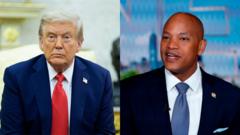In a dramatic escalation of political tensions, President Donald Trump has threatened to send military troops to Baltimore, igniting a fierce exchange with Maryland Governor Wes Moore. This confrontation stems from Moore's invitation for Trump to join him on a "safety walk" through the city, which Trump dismissed as "nasty" and "provocative," stating on social media, "If Wes Moore needs help, like Gavin Newsom did in L.A., I will send in the 'troops'... and quickly clean up the Crime."
The remarks highlight Trump’s approach to addressing crime through the deployment of National Guard troops in Democratic-controlled cities, raising alarms among Democratic leaders. Governor Moore criticized Trump's comments as "tone deaf," arguing they reflect a disconnect from the realities of Baltimore's communities, “They have not walked our streets,” he added, stressing that ongoing discussions on public safety require an understanding of local conditions.
Amidst this conflict, Trump has mobilized about 1,700 National Guardsmen across 19 states in the upcoming weeks, with many already stationed in Washington D.C., which Trump argues has become "safe" due to military presence. However, critics are concerned that utilizing military personnel for domestic enforcement constitutes an "abuse of power." Illinois Governor JB Pritzker has condemned Trump's threats to deploy troops to Chicago, adding to the chorus of disapproval from various Democratic leaders around the country.
Data from the Metropolitan Police Department indicates that violent crime in Washington D.C. has seen a significant decline, with robbery rates down by 28%. In Baltimore, recent statistics highlight a decrease in homicides, reaching their lowest levels in over half a century. Despite these positive trends, Trump’s continued assertions of a crime crisis persist, revealing a stark divide in perspectives on public safety and governance.
Additionally, a recent Washington Post poll reveals that nearly 80% of D.C. residents oppose the deployment of National Guard troops, reflecting widespread unease about federal intervention in local law enforcement matters. The ongoing debate raises fundamental questions about the balance of power between state and federal authorities, as well as the impact of high-profile political posturing on the communities involved.
The remarks highlight Trump’s approach to addressing crime through the deployment of National Guard troops in Democratic-controlled cities, raising alarms among Democratic leaders. Governor Moore criticized Trump's comments as "tone deaf," arguing they reflect a disconnect from the realities of Baltimore's communities, “They have not walked our streets,” he added, stressing that ongoing discussions on public safety require an understanding of local conditions.
Amidst this conflict, Trump has mobilized about 1,700 National Guardsmen across 19 states in the upcoming weeks, with many already stationed in Washington D.C., which Trump argues has become "safe" due to military presence. However, critics are concerned that utilizing military personnel for domestic enforcement constitutes an "abuse of power." Illinois Governor JB Pritzker has condemned Trump's threats to deploy troops to Chicago, adding to the chorus of disapproval from various Democratic leaders around the country.
Data from the Metropolitan Police Department indicates that violent crime in Washington D.C. has seen a significant decline, with robbery rates down by 28%. In Baltimore, recent statistics highlight a decrease in homicides, reaching their lowest levels in over half a century. Despite these positive trends, Trump’s continued assertions of a crime crisis persist, revealing a stark divide in perspectives on public safety and governance.
Additionally, a recent Washington Post poll reveals that nearly 80% of D.C. residents oppose the deployment of National Guard troops, reflecting widespread unease about federal intervention in local law enforcement matters. The ongoing debate raises fundamental questions about the balance of power between state and federal authorities, as well as the impact of high-profile political posturing on the communities involved.






















